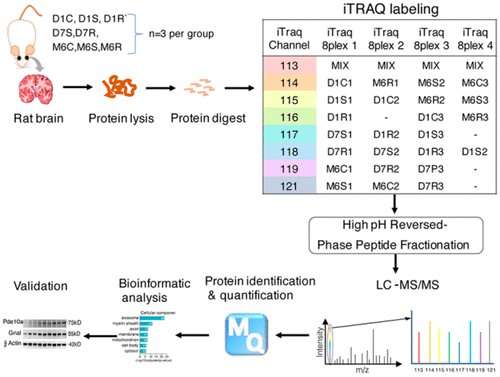Brain protein changes could explain how concussions affect patients

Traumatic brain injuries, whether suffered from a blow on the football field or the battle field, can be devastating, leading to disability and shortened lives. However, little is known about how different levels of injury and time affect the brain, hindering efforts to develop effective treatments. Scientists now report results from rodent studies in ACS' Journal of Proteome Research showing that signaling molecules are likely involved in mild cases, also known as concussions.
In 2013, U.S. emergency rooms received around 2.8 million patients with traumatic brain injuries, with nearly 50,000 patients dying, according to the U.S. Centers for Disease Control and Prevention. Brain injuries can be classified as mild, moderate or severe, with mild injuries, or concussions, representing about 75 percent of cases. Some people recover completely from such injuries, while others experience lasting disability or dementia, particularly if the patient has experienced repeated concussions. Previous proteomic studies in humans with brain injuries didn't control for the cause, while results in mice examined the effects of time since injury or repeated injury, but not both. In this proteomic study, Jianyun Yu, Hu Zhou and colleagues assessed brain protein levels after one or more concussions in rodents at multiple timepoints.
To perform the analysis, the researchers divided 27 rodents into nine groups: one day, seven days or six months after either no concussions, a single concussion or three concussions on three consecutive days. The researchers performed proteomic analysis on the brain samples using tandem mass spectrometry, identifying clusters of proteins that seemed to increase or decrease depending on injury severity or time since injury. Interestingly, molecules involved in the cAMP signaling pathway, which helps regulate heart rate, stress levels and memory, appear to play an important role in the mediation of brain injury and recovery.
More information: Hai Song et al. Quantitative Proteomic Study Reveals Up-Regulation of cAMP Signaling Pathway-Related Proteins in Mild Traumatic Brain Injury, Journal of Proteome Research (2017). DOI: 10.1021/acs.jproteome.7b00618
Abstract
Traumatic brain injury (TBI), as a neurological injury, becomes a leading cause of disability and mortality due to lacking effective therapy. About 75% of TBI is mild traumatic brain injury (mTBI). However, the complex molecular mechanisms underlying mTBI pathophysiology remains to be elucidated. In this study, iTRAQ-based quantitative proteomic approach was employed to measure temporal-global proteome changes of rat brain tissues from different time points (1 day, 7 day and 6 months) post single mTBI (smTBI) and repetitive mTBI (rmTBI). A total of 5169 proteins were identified, of which, 237 proteins were significantly changed between control rats and mTBI model rats. Fuzzy c-means (FCM) clustering analysis classified these 237 proteins into six clusters according to their temporal pattern of protein abundance. Functional bioinformatics analysis and protein–protein interaction (PPI) network mapping of these FCM clusters showed that phosphodiesterase 10A (Pde10a) and guanine nucleotide-binding protein G (olf) subunit alpha (Gnal) were the node proteins in the cAMP signaling pathway. Other biological processes, such as cell adhesion, autophagy, myelination, microtubule depolymerization and brain development, were also over-represented in FCM clusters. Further Western Blot experiments confirmed that Pde10a and Gnal were acutely up-regulated in severity-dependent manner by mTBI, but these two proteins could not be down-regulated to basal level at the time point of 6 months post repetitive mTBI. Our study demonstrated that different severity of mTBI cause significant temporal profiling change at the proteomic level and pointed out the cAMP signaling pathway-related proteins, Pde10a and Gnal, may play important roles in the pathogenesis and recovery of mTBI.













